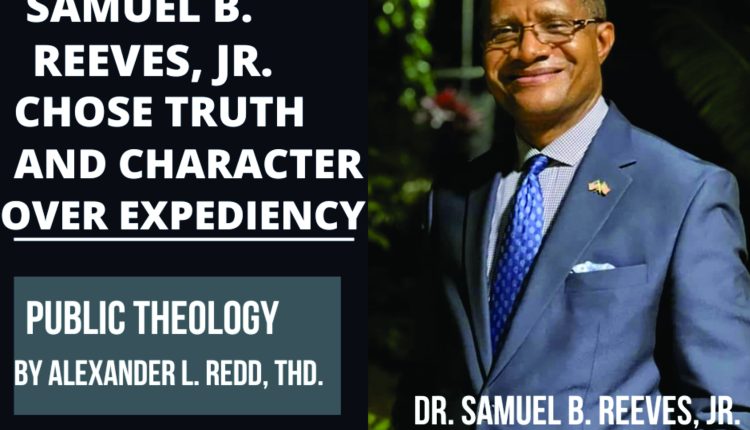By Alexander L. Redd, Th.D.
September 24, 2023
In every era of human history, there have been individuals who, fortified with moral courage, tenacity, and godly character, have chosen to speak the truth despite the prevailing circumstances and potential backlash. Like Christ Jesus in the face of death threats, these individuals stand as shining beacons of hope and integrity in societies often marred by deception, corruption, and moral decay. Among these exemplary individuals is Rev. Dr. Samuel B. Reeves, Jr., the senior pastor of Liberia’s historic Providence Baptist Church and President of the Liberia Council of Churches. His recent stance against the country’s leadership crisis has ignited a debate about the role of religious leaders in public affairs.
The Character of Truth-Telling
The courage to speak the truth, particularly in the face of opposition, is not a trait that is easily cultivated. It takes a person of extraordinary tenacity and godly character to stand firm in their convictions, especially when these convictions challenge the status quo. Dr. Reeves has consistently shown these traits in his public life. He has faced criticism for his political stance, which denounces government leadership for exacerbating citizen suffering. However, he remains committed to truth as a matter of principle, not convenience or popularity.
The Role of Character
Dr. Reeves’ commitment to truth-telling is rooted in his understanding of the importance of character. Critics may argue that his vocal opposition concerning the ongoing governmental leadership crisis compromises his neutrality and ability to serve as a peacemaker if any unforeseen future crisis arises. However, these critiques fail to acknowledge that character, not neutrality, is what qualifies someone for such a role. By prioritizing character and competence, Dr. Reeves has shown that he is not swayed by tribal association or political expediency. His stance is a powerful reminder that character, both in the church and in public office, should never be compromised.
The Call to Do Better
Beyond his political engagement, Dr. Reeves has also shown courage in addressing the shortcomings within the Liberian church community. He has consistently called for a revival of the church, emphasizing the church’s need for honesty, integrity, and accountability. This is a testament to his commitment to the truth and the betterment of religious and secular society.
The Role of the Pastor in Political Discourse
Critics often argue that pastors, as religious leaders, should abstain from participating in political discourse to maintain neutrality and focus on their spiritual responsibilities. However, this perspective not only undermines the potential influence of pastors in fostering societal change but also disregards the historical role of religious leaders in advocating for justice and truth.
The Interconnection of Religion and Politics
To argue that pastors should remain silent on political issues is to assume that religion and politics exist in separate spheres with no overlap, which is not the case. Faith shapes one’s worldview, moral compass, and attitudes toward societal issues, influencing political perspectives. By engaging in political discourse, pastors can infuse these conversations with moral insight, ethical considerations, and a focus on social justice derived from their religious beliefs.
Historical Precedence
History is replete with examples of religious leaders who have used their influence to create political change. From Martin Luther King Jr. in the Civil Rights Movement to Archbishop Desmond Tutu in the fight against apartheid, these individuals did not shy away from political involvement. Instead, they used their platforms to champion social justice, equality, and truth, often leading to significant societal transformations.
The Moral Responsibility
Pastors have a moral responsibility to their congregation and society as spiritual guides. They uphold and promote justice, equality, compassion, and truth. When political issues infringe upon these values, it becomes not just appropriate but necessary for pastors to speak out. Their silence may be perceived as complicity in the face of injustice. While the separation of church and state is a fundamental principle in many democracies, it does not preclude pastors from engaging in political discourse.
Their unique position as moral and spiritual guides empowers them to contribute valuably to these discussions, fostering a more compassionate, just, and truthful society. Therefore, rather than remaining silent, pastors should be encouraged to use their influence to promote positive change, regardless of the arena in which that change is needed. The life and work of Rev. Dr. Samuel B. Reeves, Jr. is a powerful testament to the importance of speaking truth in any season and time.
His tenacity, courage, and godly character in the face of criticism and threats are reminiscent of Christ’s own commitment to truth. His actions remind us that the pursuit of truth, the importance of character, and the courage to speak out against injustice are timeless virtues relevant in every season of human history. Whether one agrees or disagrees with his viewpoints, Dr. Reeves’ example challenges us to reevaluate our understanding of character in public office and every sphere of life.
Write the author, Alexander L. Redd, at info@gracioushopefe

